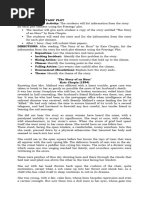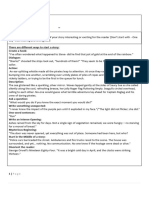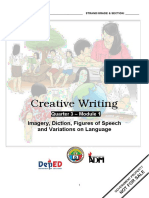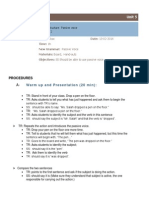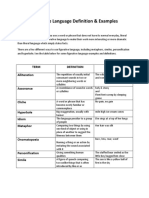Horror Story Dictogloss Teacher Notes
Horror Story Dictogloss Teacher Notes
Uploaded by
LVCopyright:
Available Formats
Horror Story Dictogloss Teacher Notes
Horror Story Dictogloss Teacher Notes
Uploaded by
LVOriginal Description:
Original Title
Copyright
Available Formats
Share this document
Did you find this document useful?
Is this content inappropriate?
Copyright:
Available Formats
Horror Story Dictogloss Teacher Notes
Horror Story Dictogloss Teacher Notes
Uploaded by
LVCopyright:
Available Formats
Horror Story Dictogloss – Teacher’s Notes
Pre-Listening
Tell students you’re going to read them the introduction to a horror story. It features a haunted mansion and the
first line is “It was a dark and stormy night…” Tell them to make predictions about what will happen.
Dictogloss
Explain the dictogloss to your students:
You will read the story to them several times. A note on delivery, read the text in a natural way, don’t pause mid-
sentence, follow the punctuation. You may want to exaggerate the pauses after full stops and commas to give
students a bit of extra processing time.
1. The first time all they have to do is listen.
2. Second time they can take notes of words and phrases, stress that it’s not a dictation and that they shouldn’t
worry if their version is different.
3. Students compare notes with a partner or in a three.
4. Students listen for a third time, taking notes and then compare with their group again. You may want to read
the text for a fourth time, gauge it with your own group.
5. Students work to recreate the text. You could do this on a Google doc so you can see the versions taking
shape. Assign each group a page of the doc so that they’re not tempted to copy each other.
6. Show them the original text and copy/paste all their versions below. Have them compare their versions and
looks for differences.
It was a dark and stormy night, the wind was whistling through the trees and the
rain was pouring down. Not only was I completely soaking wet, but also my teeth
were chattering because of the icy wind. I knocked on the door of the ancient run-
down mansion as hard as I could; little did I know the horror that awaited me on
the other side of the door. No sooner had I ceased my knocking than the door
swung slowly open. The darkness on the other side was pitch-black but so
desperate was I to get out of the storm that I jumped inside without a second
thought. Hardly had I set foot inside the house when the door slammed shut behind me…
Language Focus
Ask students to complete the following language analysis task in pairs:
Meaning – substitute the phrases in bold for other, simpler words so that the meaning is the same.
Usage – why do you think the writer decided to use the phrases in bold instead of simpler language? What
effect do these expressions have on the reader? More emphatic, more exciting, draws the reader in.
Form - Look at the word order after the inversion phrases:
o Not only…
o Little…
o No sooner
o So desperate…
o Hardly…
Complete the formula: Inversion phrase + _______ + _______ + _______
(Inversion phrase + auxiliary verb + subject + verb)
Show students further examples of each inversion:
Not only: used with a wide range of tenses and auxiliary verbs:
Not only are vampires afraid of crosses, but also garlic.
Not only did the werewolf have sharp teeth, but also long claws.
Not only would I recommend calling the police, but also I would run away as fast as I could.
Little: most commonly used with “know” and “realise”:
Little did I realise how much danger I was in.
Little did she know what had just happened in the other room.
No sooner…. than: Or Hardly…. when Most commonly used with past perfect to express that one action happened
immediately after another:
No sooner had I closed the door than I heard a strange scratching sound.
No sooner had I fallen asleep than a strange light came in through the window.
Hardly had the sound stopped when the door burst open.
Hardly had I turned around when the beast appeared at the end of the corridor.
So + adjective + that…: Used with a range of adjectives to add emphasis and express consequences:
So cold was it that my hands were shaking.
So frightening was the beast that even the brave soldier screamed in fear.
Practice - Key
1. I had just opened the door when the monster appeared.
HAD
Hardly had I opened the door when the monster appeared.
2. They had no idea that the beast was watching their every move.
REALISE
Little did they realise (that) the beast was watching their every move.
3. The enormous size of the beast’s tentacles stopped them from reaching the exit.
WERE
So enormous were the beast’s tentacles that they couldn’t reach the exit.
4. As soon as they were outside the house, she called the police.
HAD
No sooner had they got out of the house than she called the police.
5. The car wouldn’t start and the gun was jammed.
WOULD
Not only would the car not start but also the gun was jammed.
6. They didn’t know that the call was coming from inside the house until it was too late.
THAT
Little did they know/realise that the call was coming from inside the house until it was too late.
Production
Have students write another paragraph of the story either in class or for homework. Encourage them to use as many
inversions as possible and other descriptive language.
You might also like
- English Syllabus - Class 7 - Stage 8 - Cambridge Checkpoint 2019-2020Document9 pagesEnglish Syllabus - Class 7 - Stage 8 - Cambridge Checkpoint 2019-2020Pooja BhasinNo ratings yet
- English-Checkpoint Revision BookletDocument35 pagesEnglish-Checkpoint Revision Bookletakshathgschool100% (2)
- Monier Williams - Sanskrit-English Dictionary 1872Document1,222 pagesMonier Williams - Sanskrit-English Dictionary 1872Bibliovidyakar80% (10)
- 1a - My Name's Hannah, Not AnnaDocument19 pages1a - My Name's Hannah, Not AnnaLüis Chiarella ̯ü67% (6)
- Swahili Verbs Swahili Verbs: Grammar TipsDocument6 pagesSwahili Verbs Swahili Verbs: Grammar Tipsquestnvr73No ratings yet
- Las English 9 Week 4 QTR 4Document4 pagesLas English 9 Week 4 QTR 4jerome samsonNo ratings yet
- Straightforward Pre-Intermediate Unit Test 12: Name - ScoreDocument4 pagesStraightforward Pre-Intermediate Unit Test 12: Name - ScoreBogdan Slavko100% (1)
- The Tone UnitDocument13 pagesThe Tone UnitXuân VũNo ratings yet
- Horror Story Dictogloss Student HandoutDocument2 pagesHorror Story Dictogloss Student HandoutEkaterina KamenevaNo ratings yet
- Creating Tension PowerpointDocument18 pagesCreating Tension PowerpointVic ShahNo ratings yet
- Lesson 4Document10 pagesLesson 4Viv IanNo ratings yet
- Original Writing CourseworkDocument27 pagesOriginal Writing Courseworkms_polstonNo ratings yet
- Creating Tension PowerpointDocument16 pagesCreating Tension PowerpointMardin KNo ratings yet
- Manual Texts for Study_Semester1Document32 pagesManual Texts for Study_Semester1G.G. YTNo ratings yet
- Elements of SuspenseDocument12 pagesElements of Suspensemado6920111No ratings yet
- Writing Fiction.Document11 pagesWriting Fiction.Mohammad ShafkathNo ratings yet
- SHALABY PortfolioDocument6 pagesSHALABY PortfoliowshalabyNo ratings yet
- Thesis StatementDocument29 pagesThesis StatementAlexis Castillo IINo ratings yet
- End of Term Revision ListDocument6 pagesEnd of Term Revision ListInara NajafzadeNo ratings yet
- Denotation Connotation Unit 9abDocument12 pagesDenotation Connotation Unit 9abusman sajidNo ratings yet
- Writing - Unit 5 - STCDocument14 pagesWriting - Unit 5 - STCElizavetaNo ratings yet
- ENGLISH-10 Q2 Mod3Document16 pagesENGLISH-10 Q2 Mod3Chesster BalagotNo ratings yet
- Macroskills Activities - JayanneDocument11 pagesMacroskills Activities - JayanneJayanne TungedNo ratings yet
- DemoinferDocument25 pagesDemoinferEmily LipataNo ratings yet
- Lesson PlanDocument6 pagesLesson PlanRiether ParicoNo ratings yet
- ENGLISH-10 Q2 Mod3-3Document14 pagesENGLISH-10 Q2 Mod3-3Samantha Mae C. MonterdeNo ratings yet
- Narrative WritingDocument15 pagesNarrative WritingTamir Tulga100% (1)
- Story Telling IdeasDocument5 pagesStory Telling Ideaspresenmaria0% (1)
- Creative Writing TipsDocument8 pagesCreative Writing TipssinovuyoprettysotomelaNo ratings yet
- English Test 1 Varaiants-MergedDocument19 pagesEnglish Test 1 Varaiants-MergedZil-e-huma KazmiNo ratings yet
- Mystery Story Guide. (1)Document19 pagesMystery Story Guide. (1)Omar Al GhwassNo ratings yet
- Plan Tell Tale HeartDocument27 pagesPlan Tell Tale HeartRaluca Maria BobuNo ratings yet
- HomeworkDocument32 pagesHomeworkPeter ChutatapeNo ratings yet
- Ghost StoryDocument3 pagesGhost StoryPamela CherrywildNo ratings yet
- Showing Not Telling: by Mrs. MilisDocument18 pagesShowing Not Telling: by Mrs. MilisStella AngNo ratings yet
- Module 1 Women EmpowermentDocument18 pagesModule 1 Women EmpowermentIrvinAironAmigableNo ratings yet
- Short Story-Writing TipsDocument27 pagesShort Story-Writing Tipsbarbara stanners100% (2)
- Irony Lesson 1 FinalDocument9 pagesIrony Lesson 1 Finalapi-284994884No ratings yet
- Mra Engl WR SmileyDocument9 pagesMra Engl WR Smileyapi-202681219No ratings yet
- Prose and Poetry: Showing Vs Telling: Raphael Zaldy VillaseñorDocument11 pagesProse and Poetry: Showing Vs Telling: Raphael Zaldy VillaseñorLeandro Jr. RomuloNo ratings yet
- Grammar GuideDocument18 pagesGrammar GuideTonyNo ratings yet
- Theory Narrative Texts in EnglishDocument3 pagesTheory Narrative Texts in EnglishmercedesNo ratings yet
- Elements of SuspenseDocument4 pagesElements of Suspensehalaamrsadek11No ratings yet
- Celebrations HalloweenDocument4 pagesCelebrations HalloweenFiliberto ColamoreaNo ratings yet
- A Narrative Essay Tells A Story PartialDocument6 pagesA Narrative Essay Tells A Story PartialDulce Sales-LuisNo ratings yet
- Original Prose and PoetryDocument13 pagesOriginal Prose and PoetryelhmerhNo ratings yet
- ENGLISH 6 Week I 1st QuarterDocument86 pagesENGLISH 6 Week I 1st QuarterMa Herna Pelobello PasolotNo ratings yet
- RPP Kelas IX NarrativeDocument3 pagesRPP Kelas IX NarrativeHan SoonHeeNo ratings yet
- Tips On How To Write A Better Narrative EssayDocument6 pagesTips On How To Write A Better Narrative EssayAjlia AzamNo ratings yet
- Language Task and Style AnalsysisDocument23 pagesLanguage Task and Style AnalsysisWilliam IqbalNo ratings yet
- English Practice 1Document6 pagesEnglish Practice 1kaashvi2109No ratings yet
- Context Clues - Lesson PlanDocument6 pagesContext Clues - Lesson PlandianeserranNo ratings yet
- Tell Tale HeartDocument13 pagesTell Tale Heartflor100% (1)
- Pre - Post Test Student's Edition 10Document15 pagesPre - Post Test Student's Edition 10Chaii Madlangsakay TolentinoNo ratings yet
- celebrations_halloween_tn_41826 keyDocument2 pagescelebrations_halloween_tn_41826 keyTeresaBarbosaNo ratings yet
- Eng12 q3 Creative Writing Melc1-Converted-editedDocument12 pagesEng12 q3 Creative Writing Melc1-Converted-editeddon't mindmeNo ratings yet
- Module 8Document4 pagesModule 8GeraldineNo ratings yet
- Narratives - LG Ii - Class #2Document9 pagesNarratives - LG Ii - Class #2tubonumerounoNo ratings yet
- The Woman in BlackDocument2 pagesThe Woman in Blackrafeyatif06No ratings yet
- Brain On FireDocument9 pagesBrain On FiremrruniversalNo ratings yet
- Let's Do It: Activity 5: Riddle TimeDocument3 pagesLet's Do It: Activity 5: Riddle TimeEunice Frago100% (1)
- Lesson Plan Form 4Document4 pagesLesson Plan Form 4maria johnsonNo ratings yet
- Inter Text UalityDocument39 pagesInter Text UalityYhhhhhhhNo ratings yet
- KEY C2 Report Charity ConcertDocument3 pagesKEY C2 Report Charity ConcertLVNo ratings yet
- 1 - Y6 EOT2 Exam 2022Document6 pages1 - Y6 EOT2 Exam 2022LVNo ratings yet
- Inspirational Beige Social Media Feed Grid PlannerDocument1 pageInspirational Beige Social Media Feed Grid PlannerLVNo ratings yet
- Ch5 Block 6 Exam Task 1. Unscramble The Words.: SgeatDocument1 pageCh5 Block 6 Exam Task 1. Unscramble The Words.: SgeatLVNo ratings yet
- AbcdefghijklmnñopqrstuvwxyzDocument1 pageAbcdefghijklmnñopqrstuvwxyzLVNo ratings yet
- Advanced Transformations InversionDocument3 pagesAdvanced Transformations InversionLVNo ratings yet
- Y5 Block 5 Week 2Document1 pageY5 Block 5 Week 2LVNo ratings yet
- C1 Advanced Listening Worksheet 5Document9 pagesC1 Advanced Listening Worksheet 5LVNo ratings yet
- Carnival Reading Acitivity - OriginalDocument1 pageCarnival Reading Acitivity - OriginalLVNo ratings yet
- Unit 2 Large NumbersDocument16 pagesUnit 2 Large NumbersLVNo ratings yet
- Test Overview CaeDocument2 pagesTest Overview CaeLVNo ratings yet
- ch3 Workbook PageDocument1 pagech3 Workbook PageLVNo ratings yet
- Speaking MockDocument4 pagesSpeaking MockLVNo ratings yet
- Ch3 Adverbs of Frequency ReviewDocument1 pageCh3 Adverbs of Frequency ReviewLVNo ratings yet
- 57 Joan's Goats and Moe's CrowsDocument8 pages57 Joan's Goats and Moe's CrowsBakke Na Bakke100% (1)
- Unit 3: The World of Work (4 Periods)Document10 pagesUnit 3: The World of Work (4 Periods)Jhonattan David Palacios PovedaNo ratings yet
- Grade 3 English Final Term 2022Document6 pagesGrade 3 English Final Term 2022Maha AtifNo ratings yet
- Modul Japanese 17 - 20 (Pre Advance + Advance)Document36 pagesModul Japanese 17 - 20 (Pre Advance + Advance)Eva Karunia100% (1)
- Articles RulesDocument2 pagesArticles Rulesapi-247776755No ratings yet
- Ielts Writing Task 1 Describing Trends: Possible AdjectivesDocument6 pagesIelts Writing Task 1 Describing Trends: Possible AdjectivesMichelle Seno Son GonzalesNo ratings yet
- UUEG Chapter13 Adjective ClausesDocument15 pagesUUEG Chapter13 Adjective ClausesWahhaj MuhammadNo ratings yet
- Timpuri EnglezaDocument3 pagesTimpuri EnglezaBogdan MateiNo ratings yet
- Modul Smart EnglishDocument28 pagesModul Smart EnglishAzfar Afandi NazriNo ratings yet
- Line Graph - IELTS Writing Task 1 - Overall CommentsDocument2 pagesLine Graph - IELTS Writing Task 1 - Overall CommentsDistance From LoveNo ratings yet
- Lecture Notes For MolaveDocument26 pagesLecture Notes For MolaveNoemie Wapille GardeNo ratings yet
- Module 3 - Past and Past Perfect TenseDocument29 pagesModule 3 - Past and Past Perfect TenseAireen Joy Carandang MadiaNo ratings yet
- Warm Up and Presentation (20 Min) :: ProceduresDocument3 pagesWarm Up and Presentation (20 Min) :: ProcedurescimikoolNo ratings yet
- Materi Simple Present TenseDocument3 pagesMateri Simple Present TenseArsih ShlNo ratings yet
- Relative Clauses - Extra ExercisesDocument3 pagesRelative Clauses - Extra ExercisesMJ SBNo ratings yet
- Chapter 1Document13 pagesChapter 1api-294209774100% (1)
- Figurative Language Is When You Use A Word or Phrase That Does Not Have Its Normal EverydayDocument1 pageFigurative Language Is When You Use A Word or Phrase That Does Not Have Its Normal EverydayVina Marie Yap Gigante100% (1)
- B1 UNIT 3 Extra Grammar Practice RevisionDocument1 pageB1 UNIT 3 Extra Grammar Practice RevisionXime Olariaga100% (1)
- Kako Se Gradi Pasiv U Engleskom Jeziku?Document16 pagesKako Se Gradi Pasiv U Engleskom Jeziku?Tina MilovanovićNo ratings yet
- Participial PhrasesDocument36 pagesParticipial PhrasesGabbiie de ContrerasNo ratings yet
- Unit 2: Cultural Diversity: Word Noun Verb ADJ ADV NoteDocument1 pageUnit 2: Cultural Diversity: Word Noun Verb ADJ ADV NoteTâm Thành TrươngNo ratings yet
- Speakout Writing Extra Advanced Answer KeyDocument2 pagesSpeakout Writing Extra Advanced Answer Keyhector1817100% (2)
- Media Pembelajaran - PrepositionsDocument26 pagesMedia Pembelajaran - PrepositionsRafli NurusyaikaNo ratings yet
- Translation ShiftsDocument23 pagesTranslation ShiftslolyoshiNo ratings yet






















